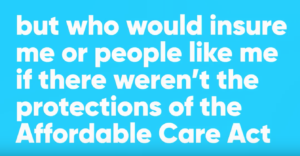Yesterday, Secretary of Health and Human Services, Alex Azar, penned an op-ed for the Washington Post in which he is caught hiding the dirty truth about the Trump Administration’s new policy to expand short-term, limited duration junk health plans. These junk plans are designed to take us back to when insurance companies could discriminate against people with pre-existing conditions, exclude coverage for services like maternity care, and charge women and older people more.
Junk plans can exclude or deny medical services such as prescription drug coverage, hospitalization, and maternity care. Even when plans say they cover prescription drugs, the benefit is often capped at a limit, such as $3,000. Adding insult to injury, short-term plans have a history of finding ways to deny coverage after people become sick. This happened to Dawn Jones, who was diagnosed with breast cancer after buying a short-term plan when she was between jobs. Despite not knowing she had breast cancer when she bought the policy, the insurance company refused to pay for her treatment, leaving her with a $400,000 medical bill.
These plans are so awful that they are opposed by more than 98 percent of health groups that filed comments with HHS about Trump Administration’s plan make them more widely available.
Here are the facts:
1. JUNK PLANS HURT PEOPLE WITH COVERAGE IN THE ACA MARKETPLACES. Sec. Azar claims that junk plans “improves the exchange risk pools.”
Healthy people will leave the individual market for these plans, causing everyone else’s premiums to go up. As the Center on Budget and Policy Priorities notes, these plans will divide the market between those who are sick and those who are healthy: “Short-term plans would be most likely to attract healthier people, leading to premium increases for ACA-compliant plans and destabilizing individual insurance markets across the nation. “
2. JUNK PLANS MAKE COMPREHENSIVE HEALTH CARE MORE EXPENSIVE. Sec. Azar claims that repealing the individual mandate and expanding junk plans mean millions who couldn’t afford health insurance “will now be able to do so.”
Repealing the individual mandate and loosening short-term plan rules drive up premiums for everyone who needs comprehensive care. The Congressional Budget Office estimates that repealing the individual mandate will increase premiums by 10 percent annually for the next decade, and a report by Wakely Consulting Group estimates that short-term plans alone will cause premiums to increase by 1.4 percent in 2019.
3. JUNK PLANS MAKE IT HARDER FOR PEOPLE TO FIND COMPREHENSIVE COVERAGE. Sec. Azar says junk plans will “improve health-care choice and competition.”
Azar could be right if you don’t have a pre-existing condition, aren’t a woman or person over fifty, don’t need maternity care or prescription drug coverage, and will never have to use the hospital over the weekend. Junk plans are allowed to discriminate against people with pre-existing conditions by dropping or denying coverage, charge women more, impose annual limits on care, and exclude basic coverage, like hospitalization, prescription drug coverage, and maternity care. In an analysis of short-term plans conducted by the Kaiser Family Foundation, no short-term plans studied covered maternity care, 62 percent did not cover substance abuse treatment, and 71 percent did not cover outpatient prescription drug services. One plan won’t cover expenses if someone is admitted to a hospital on a Friday or Saturday.
DON’T TAKE OUR WORD FOR IT: STATE OFFICIALS WARN AGAINST JUNK PLANS
State Insurance Regulators Express Concern That Short-Term Plans Are Being Marketed To Consumers In Misleading Way. “State insurance regulators, gathered over the past three days for a meeting of the National Association of Insurance Commissioners, expressed deep concern that short-term plans were being aggressively marketed in ways likely to mislead consumers. Many said the plans, which need not comply with the Affordable Care Act’s coverage mandates, were a poor substitute for comprehensive insurance.” [New York Times, 8/6/18]
(AK) Lori Wing-Heier, Director Of Alaska Insurance Division: “I’m Concerned That People Will Buy These Policies, Show Up At The Hospital For A Condition They Did Not Expect, And Discover They Are Not Covered.” [HuffPost, 8/5/18]
(CA) California Insurance Commissioner, Dave Jones: “Of Course They’ll Be Less expensive…That’s Because It’s Junk Insurance And It Won’t Cover The Same Things.” [HuffPost, 8/5/18]
(CO) Colorado Interim Insurance Commissioner, Michael Conway: People May Read Warnings, But Not Understand How Bare-bones These Plans Really Are. “They may read [the warning], but that’s not the same as understanding it…Because of the ACA, now people think the baseline has changed ― that certain things are always covered.” [HuffPost, 8/5/18]
(NY) Deputy Superintendent At New York Department Of Financial Services, Troy Oechsner: “These Are Substandard Products.” “‘These are substandard products,’ sold on the premise that ‘junk insurance is better than nothing’ for people who cannot afford comprehensive coverage, Troy J. Oechsner, a deputy superintendent at the New York Department of Financial Services, told the insurers.” [New York Times, 8/6/18]
(PA) Pennsylvania Insurance Commissioner Jessica Altman Has Already Revoked The Licenses Of Eight Brokers Or Agents Misrepresenting Short-term Plans. “In Pennsylvania, Altman said she has already revoked the licenses of eight brokers or agents who had been misrepresenting short-term plans.” [The Hill, 8/12/18]
(TN) Tennessee Insurance Commissioner, Julie Mix McPeak Is Concerned About Whether Consumers Fully Understand The Plans They Buy. “‘We have to really make sure consumers know what they’re purchasing, and they’re aware of what’s covered and what’s not covered,’ Mix McPeak said. ‘The last thing we need is for consumers to have surprise bills.'” [The Hill, 8/12/18]

